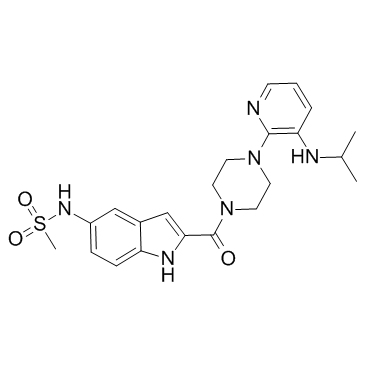136817-59-9
| Name | delavirdine |
|---|---|
| Synonyms |
[14C]-Delavirdine
delarividine 2-(4-(5-Methanesulfonamido-1H-indol-2-ylcarbonyl)-1-piperazinyl)-N-(1-methylethyl)-3-pyridinamine 1-[3-(Isopropylamino)-2-pyridyl]-4-[(5-methanesulfonamidoindol-2-yl)carbonyl]piperazine DELAVIRDINE Delavirdine Mesylate 1-(3-((1-Methylethyl)amino)-2-pyridinyl)-4-((5-((methylsulfonyl)amino)-1H-indol-2-yl)carbonyl)piperazine Unii-dol5F9jd3e Delaviridine N-[2-[[4-[3-[(1-Methylethyl)amino]-2-pyridinyl]-1-piperazinyl]carbonyl]-1H-indol-5-yl]methanesulfonamide |
| Description | Delavirdine(U 90152) is a potent non-nucleoside reverse transcriptase inhibitor (NNRTI).IC50 Value: 0.26 uM (Recombinant HIV-1 RT) [1]Target: HIV-1 reverse transcriptase; NNRTIin vitro: U-90152 [1-(5-methanesulfonamido-1H-indol-2-yl-carbonyl)-4-[3-(1-methyl eth yl-amino)pyridinyl]piperazine], which inhibited recombinant HIV-1 RT at a 50% inhibitory concentration (IC50) of 0.26 microM (compared with IC50s of > 440 microM for DNA polymerases alpha and delta). U-90152 blocked the replication in peripheral blood lymphocytes of 25 primary HIV-1 isolates, including variants that were highly resistant to 3'-azido-2',3'-dideoxythymidine (AZT) or 2',3'-dideoxyinosine, with a mean 50% effective dose of 0.066 +/- 0.137 microM. U-90152 had low cellular cytotoxicity, causing less than 8% reduction in peripheral blood lymphocyte viability at 100 microM. In experiments assessing inhibition of the spread of HIV-1IIIB in cell cultures, U-90152 was much more effective than AZT. When approximately 500 HIV-1IIIB-infected MT-4 cells were mixed 1:1,000 with uninfected cells, 3 microM AZT delayed the evidence of rapid viral growth for 7 days. In contrast, 3 microM U-90152 totally prevented the spread of HIV-1, and death and/or dilution of the original inoculum of infected cells prevented renewed viral growth after U-90152 was removed at day 24 [1]. Asdelavirdine concentration was increased from 0 to 100 microM, the K(M) for diclofenac metabolism rose from 4.5+/-0.5 to 21+/-6 microM, and V(max) declined from 4.2+/-0.1 to 0.54+/-0.08 nmol/min/mg of protein, characteristic of mixed-type inhibition [2].in vivo: The mean values (+/- standard deviations) for the maximum concentration in serum (C(max)) of ritonavir, the area under the concentration-time curve from 0 to 12 h (AUC(0-12)), and the minimum concentration in serum (C(min)) of ritonavir before the addition of delavirdine were 14.8 +/- 6.7 micro M, 94 +/- 36 micro M. h, and 3.6 +/- 2.1 micro M, respectively. These same parameters were increased to 24.6 +/- 13.9 micro M, 154 +/- 83 micro M. h, and 6.52 +/- 4.85 micro M, respectively, after the addition of delavirdine(P is <0.05 for all comparisons). Delavirdine pharmacokinetic parameters in the presence of ritonavir included a C(max) of 23 +/- 16 micro M, an AUC(0-8) of 114 +/- 75 micro M. h, and a C(min) of 9.1 +/- 7.5 micro M [3].Toxicity: Clinical trial: Quality of Life of HIV-infected Participants Switched to Raltegravir Versus Other Antiretroviral Regimens. Phase 4 |
|---|---|
| Related Catalog | |
| References |
| Density | 1.388g/cm3 |
|---|---|
| Boiling Point | 732ºC at 760mmHg |
| Melting Point | 226-228ºC |
| Molecular Formula | C22H28N6O3S |
| Molecular Weight | 456.56100 |
| Flash Point | 396.5ºC |
| Exact Mass | 456.19400 |
| PSA | 118.81000 |
| LogP | 3.94680 |
| Vapour Pressure | 2.74E-21mmHg at 25°C |
| Index of Refraction | 1.68 |
| Storage condition | -20°C Freezer |
